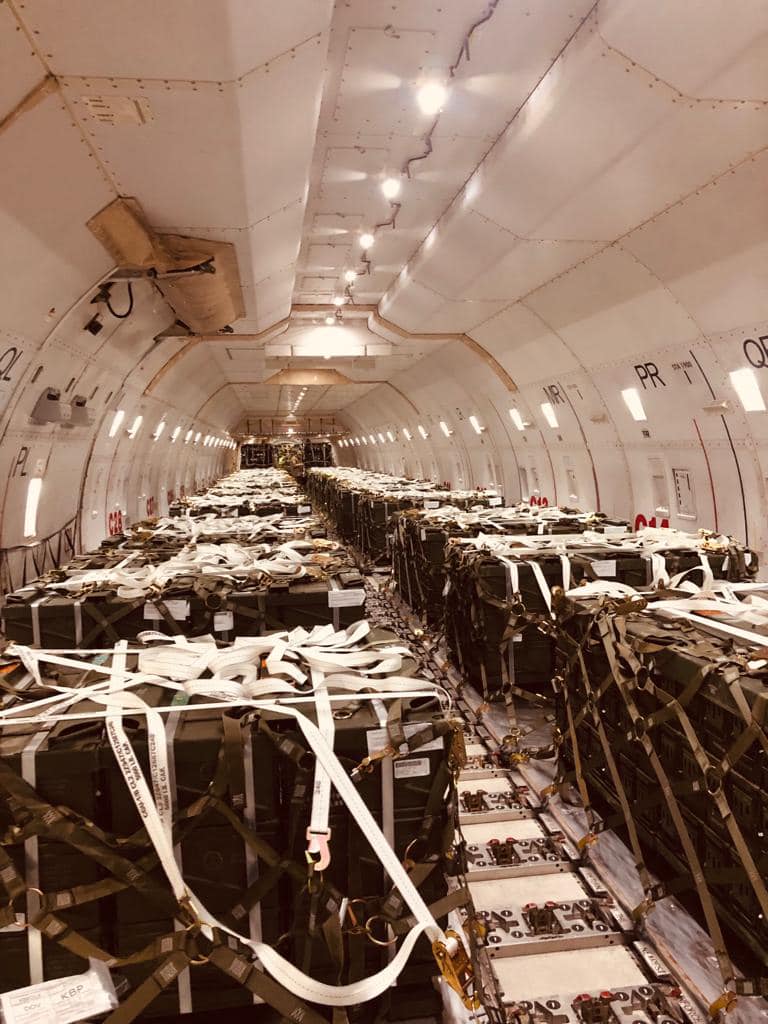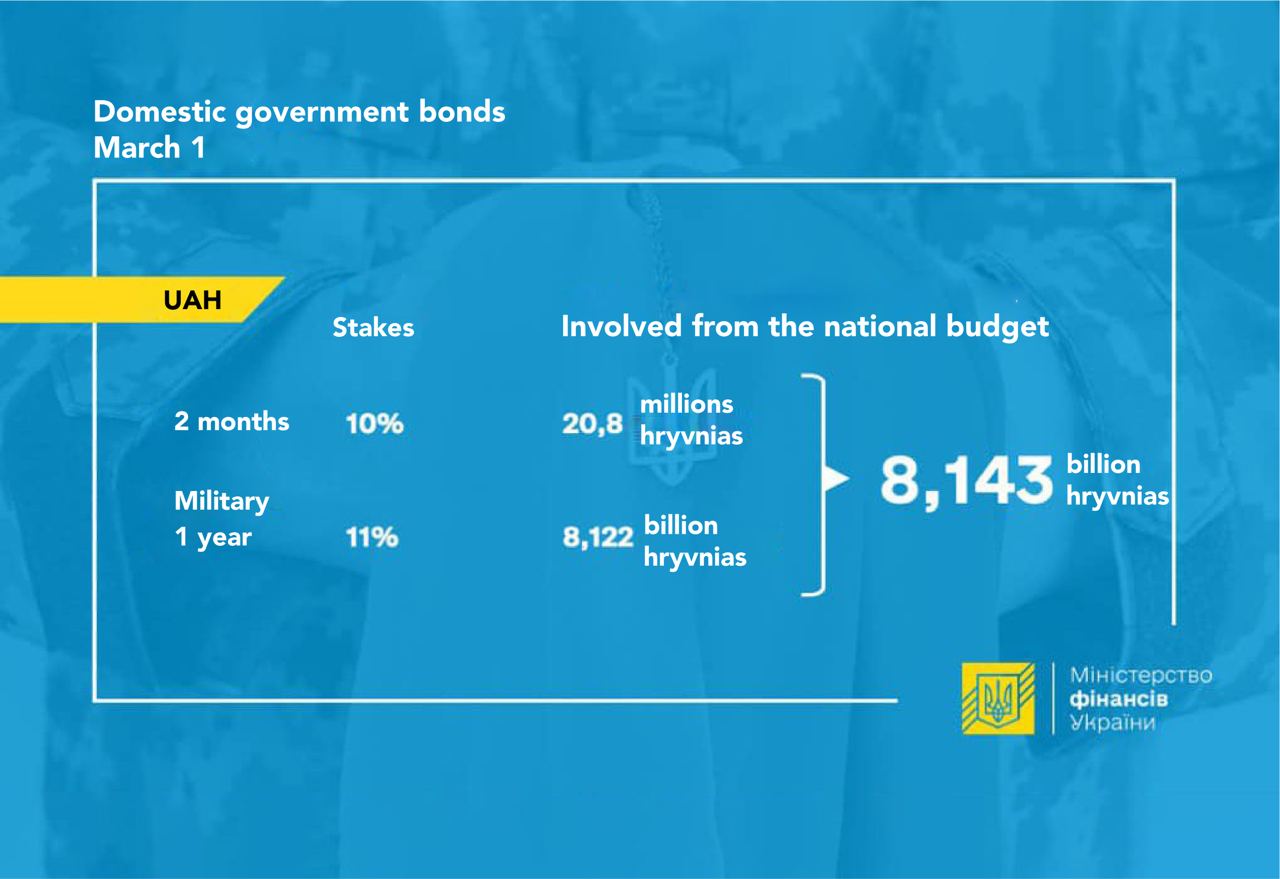Just how much is Ukraine’s budget deficit and what are the ways to fill it in
article by YULIYA SAMAYEVA, ZN.UA Economics Editor,
translation by Alexandra Kuvshinova
This war is costing us $10 billion per month—about what the entire budget for the country was in 2021. While the start of this year was not bad in terms of financial indicators, we had definitely not prepared for this level of expenditures.
According to the Ministry of Finance, the monthly deficit of government funds increased from $2.7 billion in March to $5 billion in April. Next month will show a similar trend. As they say, the patient is stable but the condition is serious. This deficit only deals with the bare minimum needed for the government to survive.There is nothing for any development or renewal funds, not even the acquisition of energy resources for the winter time, just what the government has to have to perform their most basic tasks.
Yes, the budget in March was paid for in advance, owing to taxes collected from large businesses and dividends from state-owned companies, but these payments will not repeat. A business tax reduction, coupled with a significant number of enterprise shutdowns, problems in foreign trade, and an overall decrease in demand have brought tax revenues down.
In April 2021 foriegn VAT contributed 28 billion UAH into the budget, in April 2022 it was 7.9 billion; the numbers for domestic VAT were 24.7 billion UAH and 15.6 billion, respectively. Income tax, together with military dues, were 11.5 billion UAH but decreased to 9.7 billion for April 2022. Most of our revenue has taken a significant hit—we are losing $5 billion a month in exports just due to harbor closings—and of course our expenditures are unprecedentedly large. As a result, the budget deficit for the first four months of 2022 was 146.6 billion UAH, as compared to 27.2 for the same time period in 2021.
According to ZN.UA sources in the Ministry of Finance, approximately $60 billion is required to finance the budget this year. This includes financing the budget deficit itself and paying off our debts. Before the war, $20 billion would have covered this, an amount we could have easily met. But the war and the resulting drop in GDP have impacted this number, and now we need to find three times the amount.
But wait—we are getting tons of help, so where is all the money!? Indeed, if you look at the news feed, it seems like Ukraine is drowning in money, but the truth is, it is not. We are receiving international aid but it is not always money and it does not always go to the budget. For example, Joe Biden announced that the US would give Ukraine $13 billion. But we will receive only a few billion of this in US dollars. The rest of the value will be given in weapons and humanitarian aid.
Five billion US dollars in international aid has gone into the state budget, and a future $10 billion is more or less guaranteed. Any other sums are the subject of future conversations and, once we get there, negotiations.
Another $20 billion can be printed—pardon me—, “provided” by the National Bank of Ukraine (the NBU). The government, of course, wants more. The National Bank traditionally responds with restraint: “Support from the NBU cannot be the main source of financing government expenditures”. Which should be read as: “No, we will not print unlimited amounts of money, because that would bury our stability and enter us into such a crisis that we would never get out alive”.
As the head of the NBU, Kirill Shevchenko, stressed in a comment he made to ZN.UA, “The National Bank will only finance critical government expenditures in limited amounts, and only then by buying government securities in the primary market. We will also maintain maximum transparency concerning such operations. I can assure you that once the risks of unbalancing the fiscal sector are minimized, we will move away from the practice of financing the budget.”
Apart from the NBU, another $10 to 15 billion can be acquired from the sale of domestic government bonds.
Well, we don’t have much to live on and we have to find at least $10 billion more —or, better yet, $20 billion—to get through the year. Of course, we hope that we will continue to receive help but the negotiations for this aid are difficult and protracted, and do not come with any guarantees. As yet, we do not even know for how long Ukraine will continue to live in such difficult conditions.
Meanwhile, in addition to financing military expenditures, salaries and benefits, including pensions, Ukraine still has to repay its debts. For example, by the end of this year, Ukraine needs to repay approximately $3 billion of foreign debts (including $1.9 billion in Eurobonds). There is another $10.5 billion in internal debts coming due
And the dynamics in debt statistics does not look good. In March, our public debt rose by 4%, and it will continue to grow as more and more loans are needed to finance the large deficit in our budget. We are losing GDP even faster than we are increasing debt. If at the end of March our total debt amounted to approximately 50% of last year’s GDP, by the end of 2022 it may well reach 100% of GDP. This, of course, will not help our financial sustainability.
It would therefore make a lot of sense to restructure part of our debt, or at least to reschedule the payments. It makes sense, but it is not going to happen. A large part of domestic loans are provided to the government by the NBU and state banks, and about 40% of all assets in the banking system are domestic government bonds. Restructuring this would cause significant risk to the financial system. And even if we did restructure, it is hard to imagine that the banking system would continue to share its liquidity with the state by buying military bonds.
Nor is it a good idea to do something about the money we owe to international financial organizations. First of all, it’s not that big of a deal when it comes to near-term repayments. Secondly, these loans are usually long and cheap from the start.
However, restructuring our commercial debt is advisable, especially since it has technically already happened. Since the beginning of the war, the value of these securities has fallen to 30% of their nominal value, along with any expectations of investors to earn anything from these securities; in fact, our sources say that investors are surprised that Ukraine has continued to pay these debts, because the largest force majeure of force majeures has already happened. Plus, all the possible consequences of such a restructuring—which usually compel countries to avoid such procedures—have already happened to us, because of the war: the GDP has fallen, along with investments, and we no longer have access to foreign markets.
Clearly there is no hope for a full-fledged restructuring now. It needs to be based on clear macro indicators and adequate forecasts of economic growth. Unfortunately, we simply will not have the data necessary for such calculations until the end of the war. But we could at least ask investors to postpone the repayment of these securities and, if possible, lower the coupon rate for the first post-war years. My gut tells me (and sources confirm) that we will not be denied if we ask. But the Ministry of Finance, which has to ask, has its doubts.
Different people in the ministry give different reasons for this reluctance to save money.
Some mention the fear of default. Not a full-scale default, of course, because restructuring debt is still a deferral of payment, not a refusal to pay, per se. But restructuring would definitely make things complicated for the Ministry of Finance, which is planning to issue “donation bonds” that would allow sympathetic companies to support Ukraine. It is also true that the Ministry will hardly make us rich with these donation bonds, since there are many ways to support Ukraine and those who want to have already done so.
But this, at least, seems like a realistic reason to delay, unlike another one that our sources have mentioned, i.e. a “lack of time”: “The Ministry has to sign such a large number of agreements that it simply does not have time to even think about restructuring.”
The third reason is purely image-related. After lengthy discussions on how the Ukrainian economy is stable and the Russian economy is falling into the abyss, we do not want to admit that we have to resort to the restructuring of external debts. Such reasoning seems to leave out the fact that we are at war, and winning it depends on the amount of money we have, not our positive reviews. The circumstances that force us to delay our debt payments are clear and understandable to the whole world, including our creditors.
In fact, restructuring will not solve all our problems, just $2 billion out of $10. And we do not have much time until September, when the biggest payout of the year is scheduled. After that it won’t make much sense to do it anymore.
Just to reiterate, we need $10 billion to survive this year. If the Ministry of Finance agrees, the sum can be reduced to $8 billion. Where can we get the rest? We need to take a break occasionally from signing contracts and keep looking for it. And we need to understand that this is not the last year of our lives. We cannot count on external assistance forever, the global economic situation will not work like that. We will most likely need to restart the economy not after the war, as many dream of, but during the war, in order to survive. And we don’t have much time for that restart, either.
Read this article by Yuliya Samayeva in russian and Ukrainian.
Please select it with the mouse and press Ctrl+Enter or Submit a bug














 Login with Google
Login with Google